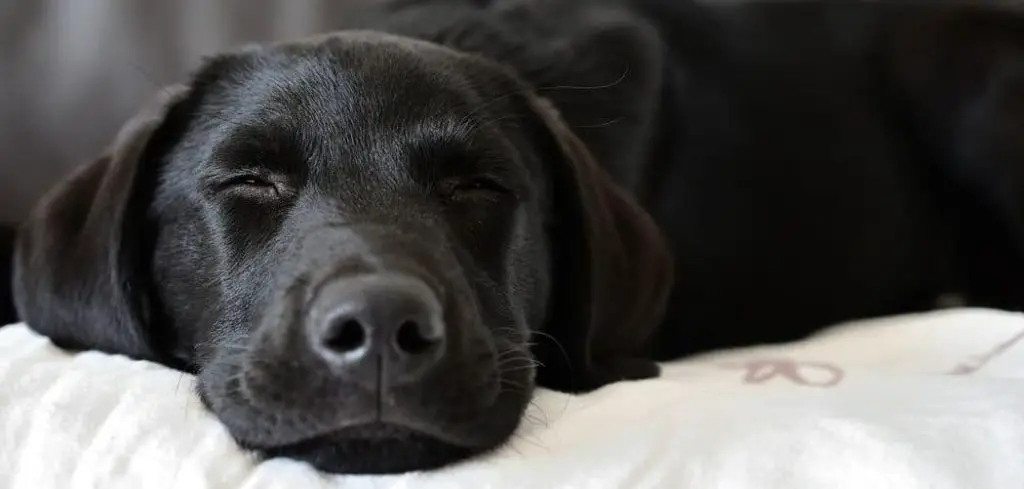It can be alarming to notice a dog breathing heavily and twitching in their sleep. While sometimes it’s harmless dreaming, it can also signal underlying health issues that require attention.
We outline the possible causes of heavy breathing and twitching in sleep in dogs, what you can do at home, and when to seek veterinary help.
Dog Breathing Heavy and Twitching in Sleep — Why It Happens
A dog breathing heavily and twitching in sleep can be due to normal dream activity or more serious medical issues. Dogs experience rapid eye movement (REM) sleep just like humans, during which they may dream, twitch, or even make noises.
However, conditions such as respiratory disease, heart problems, seizures, or overheating can also cause unusual breathing and body movements during sleep.
Recognizing whether it’s a harmless dream or a medical concern is key to protecting your dog’s health.

Dog Breathing Heavily and Twitching in Sleep: Possible Causes
Dreaming and REM Sleep
During REM sleep, a dog’s brain is highly active, leading to heavy breathing, twitching, paddling movements, and even soft vocalizations.
This is usually harmless and part of healthy sleep cycles. Owners often confuse this natural dreaming with seizures, but twitching in REM sleep tends to be brief and not accompanied by full-body rigidity.
Read more: Dog Breathing Heavy and Fast While Sleeping (Here’s why)
Respiratory Issues
Dogs with respiratory conditions such as bronchitis, pneumonia, or collapsed trachea may struggle to breathe comfortably even while resting.
Heavy breathing during sleep could worsen due to the relaxed state of the body. Twitching may occur if the dog becomes restless or distressed by low oxygen levels.
Heart Disease
Cardiac conditions can interfere with normal blood and oxygen circulation. Dogs with heart disease may pant or breathe heavily even at rest, and these symptoms can continue into sleep.
Twitching or restlessness may be linked to discomfort, coughing, or low oxygen delivery to the muscles and brain.
Seizure Activity
Some dogs experience seizures that can appear as twitching or jerking movements during sleep.
Unlike normal dream-related twitching, seizures are more intense, may last longer, and often include other signs such as drooling, stiffness, or confusion upon waking. Heavy breathing can occur before, during, or after a seizure.
Heatstroke or Overheating
Dogs rely on panting to regulate body temperature. If a dog is overheated, they may breathe heavily even when sleeping.
Muscle twitching or trembling can accompany overheating as the body struggles to cool down. This can be dangerous, especially in brachycephalic breeds (like Bulldogs or Pugs) or dogs in hot environments.
Pain or Discomfort
If a dog is experiencing pain due to injury, arthritis, or internal illness, the stress response can cause abnormal breathing and restless twitching during sleep.
This can be subtle and easily mistaken for harmless dreaming, but ongoing episodes may indicate discomfort.
What to Do If Your Dog Is Breathing Heavily and Twitching in Sleep
If your dog occasionally twitches and breathes heavily while sleeping but wakes up normally, it may simply be dream-related and not a cause for concern.
Allow them to rest undisturbed, as waking them can interrupt healthy sleep cycles.
Ensure your dog is sleeping in a comfortable, cool, and well-ventilated space. Dogs prone to overheating should avoid warm environments, especially at night.
Keeping fresh water nearby and maintaining a healthy weight also supports easier breathing.
If your dog has known heart or respiratory issues, monitor their sleeping patterns closely. Frequent or intense episodes of heavy breathing and twitching should be documented and discussed with your veterinarian.
Providing regular exercise, a balanced diet, and routine veterinary checkups can reduce risks of conditions that lead to nighttime breathing problems. Always observe whether episodes increase in frequency or intensity.
When to Call or Visit Your Vet
Seek immediate veterinary attention if your dog’s heavy breathing and twitching are accompanied by additional warning signs.
These may include blue or pale gums, prolonged episodes of rigid twitching, collapse, excessive drooling, or difficulty waking your dog.
If your dog has a history of heart disease, seizures, or respiratory illness, frequent nighttime breathing issues should never be ignored.
Even if symptoms appear mild, early evaluation can prevent more serious health complications.
Persistent or worsening episodes—especially if your dog seems distressed while awake—warrant a prompt veterinary exam.
A professional can perform diagnostic tests such as chest X-rays, blood work, or neurological exams to determine the root cause.
Read more: Dog Breathing Heavy and Shaking Head (Should you worry?)
Key Takeaway
Dog breathing heavy and twitching in sleep can sometimes be part of harmless dream activity, but it can also point to medical issues like respiratory disease, heart problems, seizures, or overheating.
Dog owners should carefully monitor these episodes and look for additional warning signs.
If symptoms are frequent, severe, or accompanied by distress, a veterinary evaluation is essential. Trust your instincts—seeking professional advice early helps ensure your dog’s safety, comfort, and long-term health.
